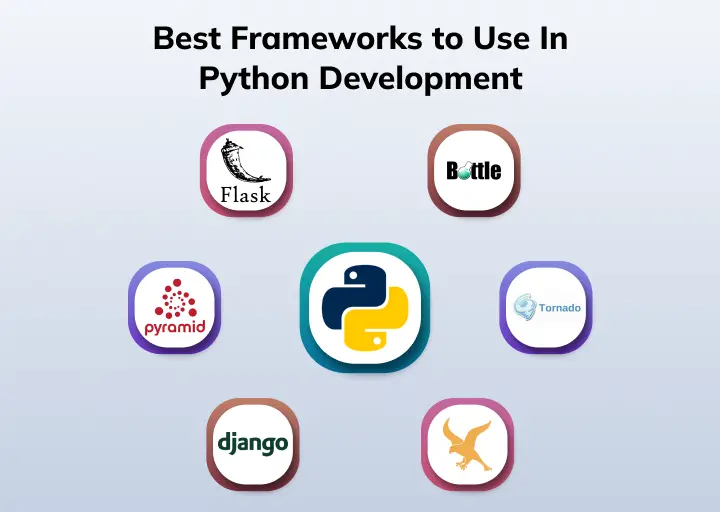Numerous surveys have verified that Python’s dominance in web development is not merely a fleeting fad but rather a well-established fact. Python continues to be a popular programming language; the Stack Overflow Developer Survey 2025 ranks it third out of all programming languages, and more than 41% of respondents choose it for web development projects. Another popular Python web framework globally is Django. These figures highlight Python’s important and expanding position in the field of web development. Let’s examine the top 12 Python web frameworks that will influence web development in the future.
Comprehending Web Frameworks Software frameworks known as web frameworks are made to facilitate the creation of web services, APIs, and applications. By providing standardized solutions to expedite routine operations such as database management and session handling, they enhance the efficiency of web development.
Insights from User Ratings Considering user ratings and feedback provides valuable insights into the popularity and effectiveness of different Python web frameworks within the developer community.
Table of Contents:
1. Why Choose Python Web Frameworks?
2. Best Python Web Development Frameworks
3. Essential Considerations for Selecting a Python Web Framework
4. Conclusion
Why Choose Python Web Frameworks?
The Appeal of Python Web Frameworks: Python web frameworks are favored for several reasons, including:
Reusable Code: They promote a structured approach to web development, allowing for reusable components across various application parts.
Enhanced Security: Built-in security features mitigate common web threats, encouraging safer web application development.
Scalability: They support growth in application functionality and traffic handling, with features that aid in scalable design.
Swift Development: Their built-in functionalities for common tasks enable rapid and efficient web application development.

Best Python Web Development Frameworks
Exploring the Top 12 Python Web Frameworks Let’s delve into the top Python web frameworks, each offering unique features and benefits for efficient web development.
Django: A full-stack framework known for its comprehensive toolkit and emphasis on security and scalability.
Flask: Celebrated for its lightweight and modular design, Flask offers simplicity and flexibility.
Pyramid: Known for its flexibility and “pay-only-for-what-you-use” philosophy, it’s ideal for unique project requirements.
Falcon: A minimalist framework focused on high performance and efficiency, perfect for fast, scalable APIs.
FastAPI: Recognized for its speed and asynchronous support, it’s ideal for modern web applications and APIs.
Tornado: Suited for real-time applications and high concurrency due to its asynchronous capabilities and WebSocket support.
Bottle: A minimalistic framework ideal for simplicity and rapid development of small web applications.
CherryPy: A simple and flexible framework with an object-oriented approach and minimalistic design.
Web2py: Known for its user-friendly, integrated environment and robust security, it’s great for scalable web applications.
BlueBream: Offers a modular, object-oriented development approach with a rich component library.
TurboGears: Integrates various tools for rapid, flexible, and developer-friendly web application development.
Dash: Specializes in interactive, data-driven web applications, making it a top choice for data visualization projects.
Essential Considerations for Selecting a Python Web Framework
Selecting an appropriate Python web framework is a crucial decision. Here’s what to keep in mind during the selection process.
Project Requirements: Confirm that the framework matches the scale, complexity, and growth potential of your project.
Learning Curve: Consider the time and effort required to learn the framework and its fit with your team’s existing expertise.
Community and Support: Look for a vibrant community, comprehensive documentation, and consistent support options.
Performance: Check if the framework can handle the specific performance needs of your application, particularly in high-traffic or dynamic environments.
Security: Seek frameworks with robust security measures and best practice guidelines.
Long-Term Viability: Make sure the framework receives regular updates and maintenance.
Legacy Systems: Verify the framework’s compatibility with any pre-existing systems.
Conclusion
Python web frameworks significantly enhance the efficiency and effectiveness of web development. Python’s broad adoption and versatility make it a top choice. Selecting the correct framework enables developers to successfully tackle python web development hurdles and craft superior online experiences.